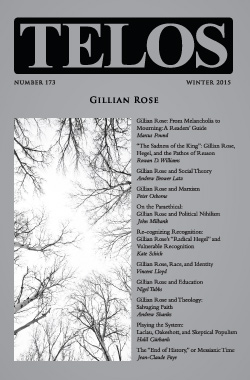Traveling in Paris, Judith Butler published a “letter” dated November 14, in English on the Verso blog and in French in Libération, the day after the ISIS attacks, entitled “Mourning becomes the Law.” The short text treats two phenomena and argues for a connection between them: the process of mourning the victims of the attacks and the expansion of counter-terrorist practices by the state. Butler’s thesis is that the shared grieving of the dead served exclusively as a vehicle to justify amplified police powers: in this sense, mourning becomes the law, or at least law enforcement. A close look at her claims, however, shows significant deficiencies in the account of mourning and an important misreading of the Parisian response.
|
By Russell A. Berman · Monday, March 28, 2016 Topics: 2016 Telos Conference, Brussels, community, François Hollande, ISIS, Judith Butler, mourning, paris, terrorism, the state By Andrew Brower Latz and Marcus Pound · Monday, December 14, 2015 Telos 173 (Winter 2015) is now available for purchase in our store. Topics: diremption, education, Gillian Rose, Hegel, introduction, Marxism, melancholy, mourning, politics, race, recognition theory, social theory, Telos 173, theology |
Current IssueSubscribe to TelosNow Available!Recent PostsTELOSscope Archives |
|||
|
Telos Press Publishing · PO Box 811 · Candor, NY 13743 · Phone: 212-228-6479 Privacy Policy · Data Protection Copyright © 2025 Telos Press Publishing · All Rights Reserved Our website uses cookies to enhance your experience and show you more relevant content.
For more information, please see our privacy policy. By using our site, you agree to our use of cookies. OK |
||||
 Gillian Rose (1947–1995) had an influence in excess of her literary output and treatment in secondary literature. Author of eight books, two articles, and four book reviews, she also had important, though perhaps hidden, effects on the UK academic scene through academic friendship, doctoral supervision, and interdisciplinary work. She inspired many students and colleagues, even where she does not appear in bibliographies or citations. She made major contributions to introducing the Frankfurt School to the UK; aided the Hegel renaissance in English-language scholarship; and was an early critic of post-structuralism and political theology. Several of the papers gathered here were first given at a conference at Durham University on January 9, 2015, to mark the twentieth year since Rose’s death. That conference and this special issue of Telos are premised on the view that Rose’s work still has much philosophical insight and inspiration to offer. The authors of these papers were students, colleagues, and/or friends of Rose, or studied her work as part of their doctoral research. The diversity of their fields reflects some of the range and interdisciplinarity of Rose’s own work: Hegel, social theory, Marxism, politics, race, recognition theory, education, and theology. We hope that this issue provokes a renewed interest in what Rose can still offer us today.
Gillian Rose (1947–1995) had an influence in excess of her literary output and treatment in secondary literature. Author of eight books, two articles, and four book reviews, she also had important, though perhaps hidden, effects on the UK academic scene through academic friendship, doctoral supervision, and interdisciplinary work. She inspired many students and colleagues, even where she does not appear in bibliographies or citations. She made major contributions to introducing the Frankfurt School to the UK; aided the Hegel renaissance in English-language scholarship; and was an early critic of post-structuralism and political theology. Several of the papers gathered here were first given at a conference at Durham University on January 9, 2015, to mark the twentieth year since Rose’s death. That conference and this special issue of Telos are premised on the view that Rose’s work still has much philosophical insight and inspiration to offer. The authors of these papers were students, colleagues, and/or friends of Rose, or studied her work as part of their doctoral research. The diversity of their fields reflects some of the range and interdisciplinarity of Rose’s own work: Hegel, social theory, Marxism, politics, race, recognition theory, education, and theology. We hope that this issue provokes a renewed interest in what Rose can still offer us today. 

